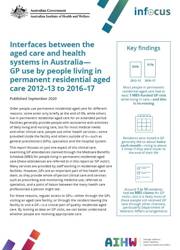Summary
People living in permanent residential aged care are often frail and have medically complex care needs. The number of people in care has been increasing steadily over time, as Australia’s older population continues to grow. As programs and policies have sought to assist people to live at home for as long as possible, those who enter permanent residential aged care may also do so in an increasingly more frail state, but this is difficult to assess using available aged care data.
Many supports, particularly nursing care and allied health services, are routinely provided in residential aged care. However, people also require access to other health services, such as those provided by GPs. GPs assess people’s current medical needs, plan for these into the future, prescribe and review medicines, and liaise with other health care professionals—regular access to GPs is a key part of quality of care in residential aged care.
This report examines GP attendances claimed through the Medicare Benefits Schedule (MBS) for people living in permanent residential aged care (these attendances are referred to here as ‘GP visits’). It highlights that patterns of GP visits vary between people, as well as between residential aged care facilities.
It also illustrates the benefits of using linked data to better understand the experiences of older people in residential aged care, and points out some of the limitations of only using MBS data. For example, this does not include information about GP services delivered under Department of Veterans’ Affairs (DVA) arrangements. The AIHW and DVA will work together to strengthen data arrangements in the future.



